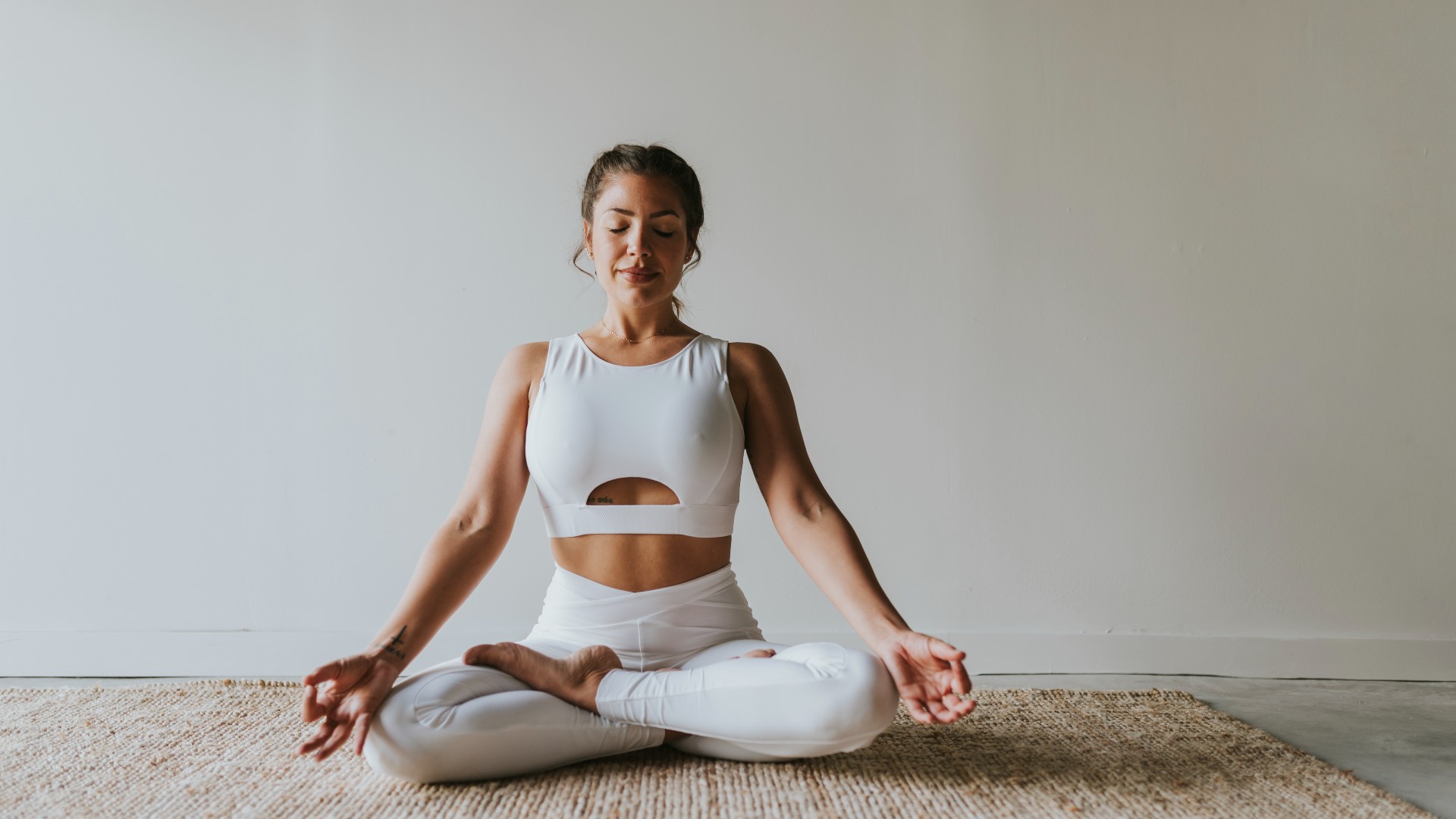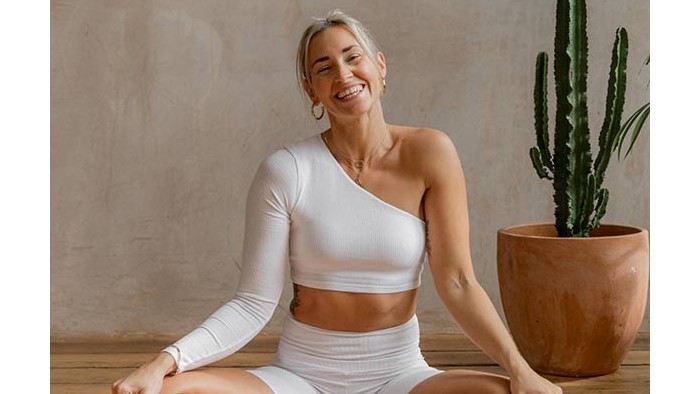
If knee pain is slowing down your exercise routine, this 20-minute yoga practice could be your answer to a stronger set of legs and knees. My niggling knees jumped (well, nearly) at the chance to try this at-home yoga class, and I wasn’t disappointed. The routine comes from YouTube sensation Cat Meffan, yoga teacher and founder of the Soul Sanctuary, and aims to strengthen and stretch knees, glutes, and hamstrings in one compact class.
“From personal experience as a yoga teacher and someone who has had their fair share of knee injuries, I know only too well how yoga can both benefit and hinder your knees,” she says. “When we think about strengthening the knees, we need to strengthen the muscles around them. The knee joint is surrounded by lots of big and beautiful muscles, but two of those will help your knee strength and stability — the glutes and hamstrings.”
Learn what causes knee pain and the best knee-strengthening exercises and what happened when our fitness editor tried this yoga for beginners yoga with Adriene workout. Or, read on as I plant down on one of the best yoga mats, channel my inner yogi and try this yoga for knee pain workout.
What is Cat Meffan's yoga for knee pain workout?
This 20-minute yoga flow is short and sweet. Over time, the stronger your glutes, hamstrings, and quads become, the more stable your knees will feel. Yoga can't promise pain-free knees, but it can help alleviate pain and strengthen the muscles around the knee joint.
“This video can also alleviate back pain,” Meffan says. “There is no one-size-fits-all approach for what you should or shouldn’t do, but as a general rule with injury, it’s good to seek out the advice of a medical professional.”
You can find the full workout via Meffan’s YouTube channel below, with step-by-step cueing and alternatives for each asana, but I’ve summarized some key points for you to follow, which should paint a picture.
The routine:
Get instant access to breaking news, the hottest reviews, great deals and helpful tips.
This routine starts as many yoga classes do — in a child’s pose. If you struggle to bring your bum to heels, you can place a yoga accessory or cushion underneath, then rest your forehead on the floor. It’s the perfect opportunity to slow your breathing and connect breath and body (a key yogic principle). Meffan then guides you to a tabletop position, cueing you to kick your leg back for a gentle calf and hamstring stretch before generating heat using Pilates-Esque glute pulses.
Next up, a staple downward dog. Not only does this activate the backs of your legs, but it also offers a gentle stretch through your upper back and shoulders, too. Meffan adds pedals through the heels before cycling through some balances to challenge your core stabilizing muscles (including your glutes) and general lower body strengthening; this involves moving through a series of warrior III, (and again) adding some pulses into the mix.
Throughout the class, you can expect a similar series of strengthening exercises (like Goddess pose, similar to a sumo squat), followed by shorter bursts of pulses and softer, lengthening stretches. The yoga for knee pain workout finishes with a seated forward fold, legs outstretched. If this is uncomfortable for your back, you can lie down. Meffan then invites you to close your eyes and focus on your breath — lovely.
I just tried this yoga for knee pain workout — here’s what happened
Yoga for knee pain has generated heaps of interest, with research — like this study in Frontiers — indicating that yoga can improve muscular strength, flexibility, and functional mobility. As we age, knee pain will likely worsen if left untreated, so yoga could be the low-impact savior we all need.
Although this routine is lunge-free, Meffan warns that lunges are a common knee pain trigger in yoga. While great for stretching the hip flexors and quads, it adds pressure to your knee joint, too. She recommends extra padding and props if you plan to do them and adds, “push the top of the back foot down into your mat, activating the glutes and taking some weight and pressure off the knee.”
What's my verdict?
To be honest, I expected yoga for knee pain to be a bit boring. I had (somewhat prematurely) assigned a restorative class to involve laying on my back in drawn-out stretches while scrolling through my phone. This couldn’t have been further from the truth, and I’m pleasantly surprised at how challenging it was.
It’s flowy and dynamic, incorporating leg and glute pulses to improve strength. Knee and lower back pain often originate from tight hamstrings and weak glutes, so I was glad to see focus pulled away from isolating the knee and, instead, stretching and working those underused muscles. Plus, my quads and glutes were on fire — warrior III single-leg balances are a slow killer and neverending.
Could this class build the legs of my dreams? Possibly. I felt mentally calm and physically supple after this yoga for knee pain class, gliding around my flat with noticeably energized and flexible legs and open hips. Regular practice will certainly improve strength, but if toned and sculpted legs are the goal, I recommend adding regular resistance training and a healthy diet into the mix for good measure.
Up next: We tried Kim Kardashian’s glute workout here’s what happened, and these are 11 of the best ab workouts around. Plus, we asked an expert — sit-ups vs crunches: Which ab exercise is better?

With a 600hr-qualification under her belt, Cat has additional expertise as a sound healer, breath work coach and retreat facilitator. She is also the founder of the online platform Soul Sanctuary.

Sam Hopes is a level 3 qualified trainer, a level 2 Reiki practitioner and fitness editor at Tom's Guide. She is also currently undertaking her Yoga For Athletes training course.
Sam has written for various fitness brands and websites over the years and has experience across brands at Future, such as Live Science, Fit&Well, Coach, and T3.
Having coached at fitness studios like F45 and Virgin Active and personal trained, Sam now primarily teaches outdoor bootcamps, bodyweight, calisthenics and kettlebells.
She also coaches mobility and flexibility classes several times a week and believes that true strength comes from a holistic approach to training your body.
Sam has completed two mixed doubles Hyrox competitions in London and the Netherlands and finished her first doubles attempt in 1:11.
 Club Benefits
Club Benefits






